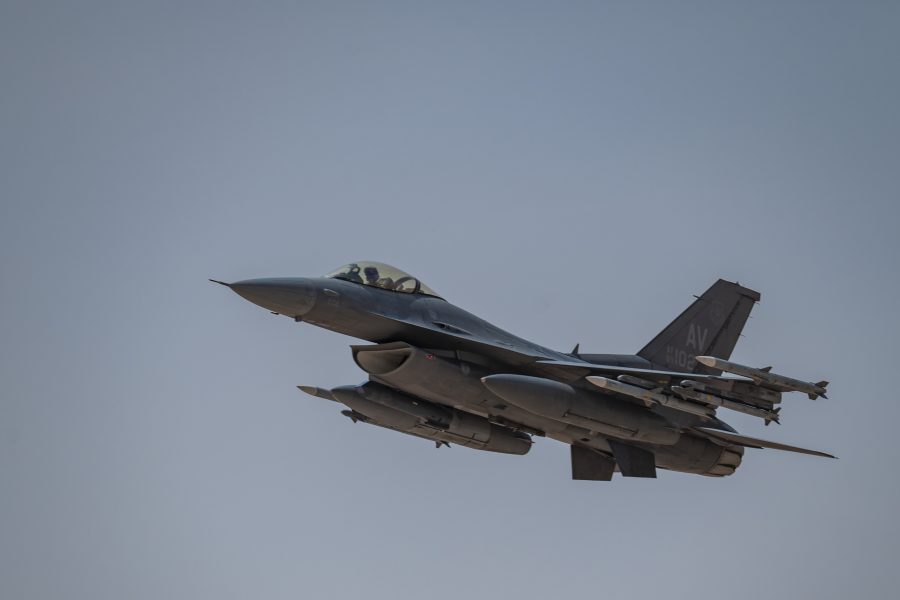The U.S. military is ordering additional U.S. Air Force fighters to the Middle East after Israel launched punishing attacks on Lebanese Hezbollah and killed the group’s leader, Hassan Nasrallah, U.S. officials told Air & Space Forces Magazine.
The U.S. will send three additional squadrons of fighter and attack aircraft to the region: an F-16 Fighting Falcon squadron, an F-15E Strike Eagle squadron, and an A-10 Thunderbolt II squadron, Air & Space Forces Magazine has learned. The U.S. is also extending the deployment of current aircraft units in the Middle East to increase the overall number of fighters and attack aircraft in the region, officials said.
The U.S. has pledged to defend Israel from retaliation from Iran, which backs Hezbollah, for the killing of Nasrallah. American F-15Es and F-16s helped Israel fend off a massive Iranian missile and drone attack in April by shooting down some 80 drones.
The U.S. already has F-22 air superiority fighters in the Middle East, which it sent to the region in August. They will continue their deployment.
The Pentagon previously announced that it is keeping the USS Abraham Lincoln aircraft carrier strike group, which carries F-35C Lightning II and F/A-18E/F Super Hornet fighters, in the Middle East.
Deputy Pentagon Press Secretary Sabrina Singh told reporters on Sept. 30 that more aircraft and an “additional few thousand” U.S. personnel were heading to the region.
Secretary of Defense Lloyd J. Austin III “believes that that is the best way for our forces in the region to have the defense that they need, and, of course, if needed to come to the defense of Israel,” Singh said.
The USS Harry S. Truman aircraft carrier deployed last week from Virginia and is expected to head to the Mediterranean Sea. The USS Wasp, an amphibious assault ship that carries AV-8 Harrier attack planes, V-22 Ospreys tiltrotor aircraft, and some 2,200 Marines and Sailors from the 24th Marine Expeditionary Unit, is operating in the Eastern Mediterranean.
“This afloat posture is complemented by DOD’s elevated fighter and attack squadron presence, including F-22, F-15E, F-16, and A-10 aircraft, and we will further reinforce our defensive air-support capabilities in the coming days,” Pentagon Press Secretary Air Force Maj. Gen. Patrick S. Ryder said in a Sept. 29 statement.
F-16s from the 510th Fighter Squadron at Aviano Air Base, Italy, and F-15Es from the 335th Fighter Squadron at Seymour Johnson Air Force Base, N.C., first deployed to the region in April of this year.
The U.S. boosted the number of warplanes in the region following Hamas’ Oct. 7 attack on Israel by arranging for current units to temporarily extend their deployments so that they overlapped with the incoming forces. The U.S. also conducted such a move in April before Iran attacked Israel.
Singh confirmed the Pentagon was lengthening the deployment of current units while new aircraft came in as part of its move to increase airpower in the region.
“This includes a certain number of units already deployed to the Middle East region that will be extended, and the forces due to rotate into theater to replace them will now instead augment the in-place forces already in the region,” Singh told reporters.
“The Secretary also increased the readiness of additional U.S. forces to deploy, elevating our preparedness to respond to various contingencies and DOD maintains robust and integrated air defense capabilities across the Middle East region, ensuring the protection of U.S. forces operating in the region,” she added.
The U.S. had already deployed a small number of additional ground troops to the region before Israel’s killing of Nasrallah, which occurred in a Sept. 27 airstrike by F-15Is from the Israeli Air Force.
In a statement, Austin said he spoke with Israeli Minister of Defense Yoav Gallant on Sept. 30 and “reiterated the serious consequences for Iran in the event Iran chooses to launch a direct military attack against Israel.”
